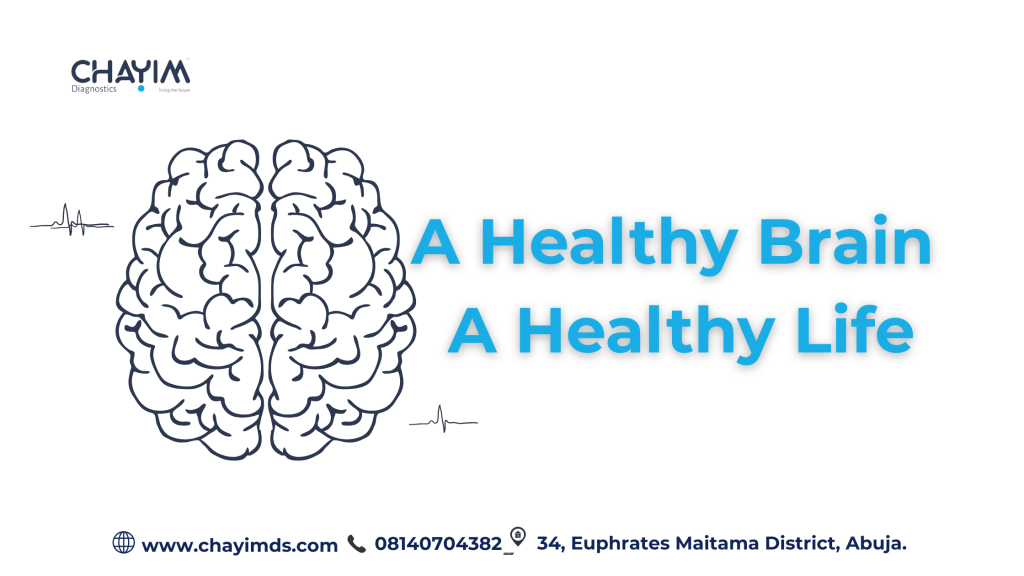A Healthy Brain, A Healthy Life

Your thought! The step you take! Every memory you hold!
It all begins in one place: YOUR BRAIN.
Brain health can be defined as a state of cognitive, emotional, and behavioral functioning that allows individuals to cope with life situations and perform daily tasks. Aspects of brain health include but are not limited to memory, attention, perception, movement, problem-solving and emotional regulation.
Contrary to the popular belief that brain issues develop at old age, it often begins to deteriorate in your 40s, 30s, and believe it or not, even in our 20s. Yes, your 20s.
If you frequently experience trouble finding words or expressing thoughts, difficulty concentrating, getting easily confused, difficulty recalling recent details or juggling multiple tasks, those are some signs that we often take for granted. An increased reliance on reminders, mood swings, irritability, and persistent brain fog may all be subtle signs that your brain is under strain much earlier in life than you’d expect.
How to Protect Your Brain.
While some brain diseases are genetic and not much can be done about those, lifestyle related brain damage is often preventable. Our lifestyle habits play a tremendous role in maintaining and enhancing cognitive function and overall brain health. Replacing unhealthy habits with those that keep your brain active has been proven to significantly enhance cognitive function over time.
1. Eat for your brain
To keep your brain sharp, focused, and energized, fuel it with Omega-3 fats which are found in fishes such as mackerel, leafy greens such as fluted pumpkin leaves (ugwu), spinach and “green“, antioxidants as found in berries, nuts, and seeds.
2. Stay active
Regular physical activity enhances memory, sharpens focus, improves problem-solving skills, and even increases the brain’s ability to adapt and grow (a process called neuroplasticity). Exercise increases blood flow and oxygen to the brain, triggers the release of feel-good chemicals like endorphins, and stimulates the production of brain-repairing proteins which support learning and memory. It also helps manage stress, lifts mood, improves sleep, and lowers the risk of age-related decline, dementia, anxiety, and depression.
3. Sleep well
While you sleep, your brain clears out toxins, strengthens neural connections, and consolidates memories turning short-term learning into long-term knowledge. Quality sleep improves focus, decision-making, and emotional balance. Prioritizing 7–9 hours of restful sleep each night is one of the simplest ways to protect and boost your brain health.
4. Manage stress
Practicing mindfulness is one of the most effective ways to manage stress and protect your mental clarity. It involves being fully present in the moment whether through meditation, deep breathing, quiet reflection, or simply observing your thoughts without judgment. When you pause and center your mind, it helps break the cycle of constant worry and mental overload. Over time, mindfulness can lower cortisol (your stress hormone), reduce anxiety, and improve emotional regulation. Even just 5–10 minutes of stillness a day can create a noticeable difference in how your brain processes stress and how calm and focused you feel throughout the day.
5. Keep learning
Learn new things always. New languages, new skills, new ways of doing the things you already know, for instance, writing with your non-dominant hand. Consistently reading and engaging in activities that encourage deep thinking and pose as a challenge help to stimulate the brain positively.
Your brain is your most powerful asset which is exactly why protecting it should start now, not later. Don’t wait for the signs of decline before you take action. The habits you build today will shape how clearly, confidently, and powerfully your brain will serve you in the years to come. Prioritize your brain health now because it ultimately determines how you will live the rest of your life.



Responses